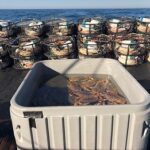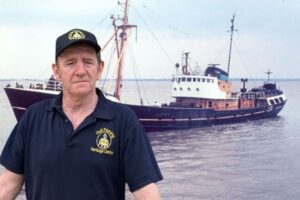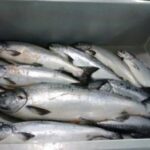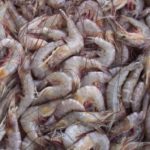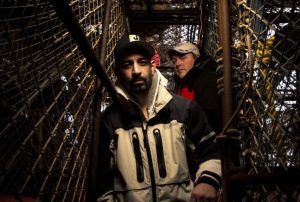Tag Archives: Department of Fisheries and Oceans

FISH-NL condemns DFO’s discriminatory restriction to latest scientific information on commercial fish stocks
The Federation of Independent Sea Harvesters of Newfoundland and Labrador (FISH-NL) condemns a move by the federal Department of Fisheries and Oceans this year to limit access to the release of the latest scientific information on the status of key commercial fish stocks, and calls for a more fair and open process. “The raw scientific data on the status of commercial stocks such as shrimp, crab, caplin and groundfish should be available for all hands to absorb at one time,” says Ryan Cleary, President of FISH-NL. “This is a huge leap backwards for transparency. >click to read< 19:55
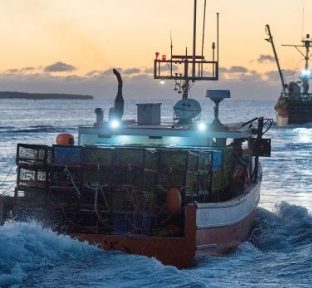
Indigenous fishermen hope to be arrested, trigger court case as Nova Scotia lobster season kicks off
As one of the most lucrative fisheries in Canada prepares for opening day, some Mi’kmaq in Nova Scotia are trying to trigger a court battle over Indigenous fishing, hoping it will see them win a greater share of the thriving lobster business. And they are daring the Department of Fisheries and Oceans to arrest them. One of them is Cheryl Maloney, an activist, law school graduate and mother of four boys. She wants her family to be able to earn the “moderate livelihood” she says the Supreme Court of Canada ruled they are entitled to in 1999. click here to read the story 09:19
Marine Protected Areas – Fishermen say Ottawa not clear on what potential protected areas will mean for fishing grounds
Cape Breton snow crab fisherman Basil MacLean speaks for many in coastal 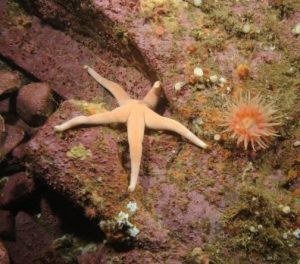 when he complains Ottawa has not been clear about what a potential marine protected area (MPA) will mean in his fishing grounds. “We’ve got no clarity. We got no idea what they want to protect,” he says. Earlier this year, officials with the Department of Fisheries and Oceans revealed an area known as the Cape Breton Trough in western Cape Breton is a potential candidate for designation as a marine protected area. The Trough overlaps the lucrative snow crab grounds known in DFO bureaucratise as Area 19. click here to read the story 11:41
when he complains Ottawa has not been clear about what a potential marine protected area (MPA) will mean in his fishing grounds. “We’ve got no clarity. We got no idea what they want to protect,” he says. Earlier this year, officials with the Department of Fisheries and Oceans revealed an area known as the Cape Breton Trough in western Cape Breton is a potential candidate for designation as a marine protected area. The Trough overlaps the lucrative snow crab grounds known in DFO bureaucratise as Area 19. click here to read the story 11:41
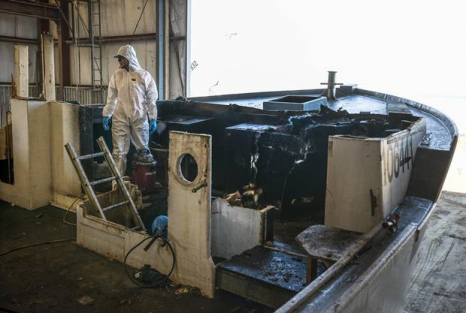
Lobster wars
Burned out fishing boats, thousands of pounds of dumped, dead lobsters and allegations of a booming black market for the popular crustacean have drawn federal investigators to Nova Scotia’s most lucrative fishing grounds in the lead-up to lobster season. Tensions have been running high in recent weeks along the small wharves in the communities that dot St. Mary’s Bay, a well-known breeding ground for lobsters during the summer. While conservation laws prevent lobster fishers from harvesting the shellfish during breeding season in order to safeguard stocks, stunned locals watched thousands of pounds of lobsters that appeared to be commercial loads pass over their docks though the summer months. click here to read the story 10:53
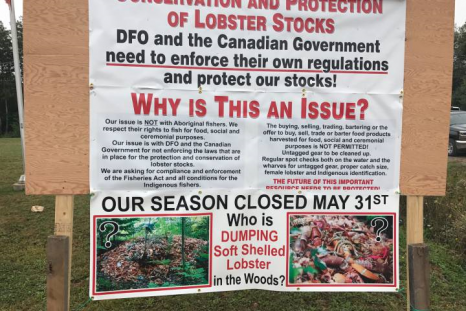
Fishermen protest outside Fisheries office, lobsters dumped at ‘dozens’ of sites across Nova Scotia
Several dozen lobster fishermen gathered outside a federal Department of Fisheries and Oceans (DFO) office in southwestern Nova Scotia on Monday to continue their protest over what they say is an illegal Indigenous commercial fishery. Bernie Berry of the Coldwater Lobster Association said about 50 protesters were in Digby to keep pressure on DFO officials to enforce regulations concerning the sale of lobster caught outside the regular season by Indigenous fishermen. Video, click here to read the story 14:47
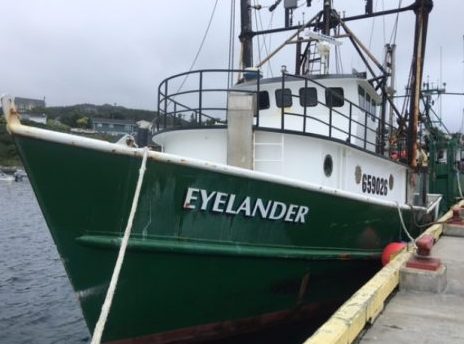
Boat captain admits ‘negligence’ in oil spill near Witless Bay reserve
The captain of the fishing vessel than ran aground Friday — spilling diesel near the Witless Bay Ecological Reserve — says the incident was due to “negligence” on his part. Capt. Joseph Swan, who declined an on-camera interview, told CBC News Monday he should have been awake when the incident happened, but it was the rocks grinding against the vessel Eyelander that woke him up. The 35 to 55 litres of diesel from a bilge pump on the boat that ended up in the water have been cleaned up, according to the Department of Fisheries and Oceans. The boat, which is from Fairhaven, Mass., ended up on the rock near Green Island on Friday morning, prompting a mayday call from the crew. All five people on board were transported safely to Bay Bulls by a rescue craft from the nearby West Aquarius oil rig.click here to read the story 08:37
Police lay charge stemming from April protest at DFO headquarters; FISH-NL says authorities setting bad precedent
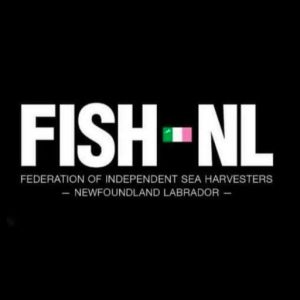 The Federation of Independent Sea Harvesters of Newfoundland and Labrador (FISH-NL) is shocked to learn a charge has been laid against an inshore harvester from La Scie involved in an April demonstration at the St. John’s headquarters of the federal Department of Fisheries and Oceans. “Inshore harvesters have been driven to the point of protest by direct threats to their livelihoods,” says Ryan Cleary, President of FISH-NL. “They should not be charged, especially after police said they wouldn’t be.” “But like the promise made by federal Fisheries and Oceans Minister Dominic LeBlanc that he would meet with hunger striker Richard Gillett, words these days appear to mean nothing.” click here to read the press release 16:16
The Federation of Independent Sea Harvesters of Newfoundland and Labrador (FISH-NL) is shocked to learn a charge has been laid against an inshore harvester from La Scie involved in an April demonstration at the St. John’s headquarters of the federal Department of Fisheries and Oceans. “Inshore harvesters have been driven to the point of protest by direct threats to their livelihoods,” says Ryan Cleary, President of FISH-NL. “They should not be charged, especially after police said they wouldn’t be.” “But like the promise made by federal Fisheries and Oceans Minister Dominic LeBlanc that he would meet with hunger striker Richard Gillett, words these days appear to mean nothing.” click here to read the press release 16:16
DFO will talk to Nova Scotia about growing number of Marine Protected Areas
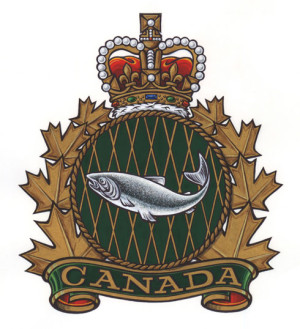 The Department of Fisheries and Oceans will meet with the province to discuss its concerns about the growing numbers of marine protected areas being designated off Nova Scotia, a department spokesman says. In April, the province asked Ottawa to stop making additional designations until other provinces and territories reach the same numbers achieved off Nova Scotia. The McNeil government is concerned the creation of more marine protected areas will have a negative impact on Nova Scotia’s economy. Marine-protected designations restrict human activities like fishing and offshore energy development. click here to read the story 11:30
The Department of Fisheries and Oceans will meet with the province to discuss its concerns about the growing numbers of marine protected areas being designated off Nova Scotia, a department spokesman says. In April, the province asked Ottawa to stop making additional designations until other provinces and territories reach the same numbers achieved off Nova Scotia. The McNeil government is concerned the creation of more marine protected areas will have a negative impact on Nova Scotia’s economy. Marine-protected designations restrict human activities like fishing and offshore energy development. click here to read the story 11:30
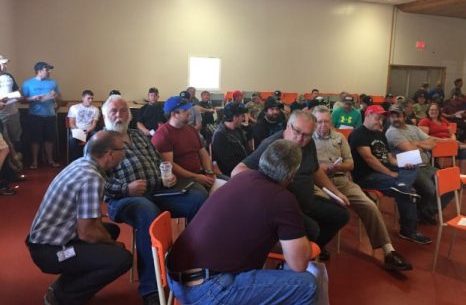
Nova Scotia lobster fishermen reject idea of surveillance cameras on boats
The global demand by consumers (enviro’s) that seafood be harvested sustainably made its way into a firehall in Lockeport Thursday. More than a hundred fishermen from southwest Nova Scotia showed up at an information session on the use of video cameras on fishing boats to monitor catch. The session was hosted by the Department of Fisheries and Oceans and organized by the Ecology Action Centre. A fisherman from British Columbia and a program manager from the Gulf of Maine Research Institute both spoke about the use of camera monitoring in those regions. At issue is the bycatch of endangered or threatened species. In Nova Scotia’s lobster fishery, the Atlantic cod and cusk are among fish stocks to watch as they get trapped along with the crustaceans. Many of the fishermen who attended the workshop were upset about the perceived need for cameras, and suspicious about an invasion of privacy. click here to read the story 08:10
King fishery closed
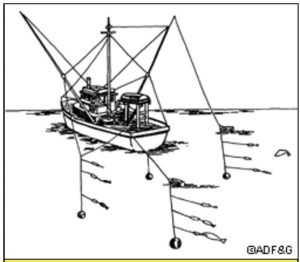 Fisheries managers in Southcentral Alaska might still be wrestling with what to do about a weak return of king salmon to the Copper River, but their counterparts in Southeast Alaska have acted to protect kings returning to the Taku and Stikine Rivers. Officials with the Alaska Department of Fish and Game today announced commercial troll fisheries which catch most of the Southeast kings, or Chinook as they are otherwise called will close at midnight Sunday. Preseason forecasts for wild Chinook salmon production in Southeast Alaska are at an all-time low, a press release said. Typically, in the Taku and Stikine rivers, nearly half the run has entered the river by the end of the third week of May; however, record low numbers of Chinook salmon are being seen in-river this year. The Taku and Stikine are transboundary rivers, and Fish and Game runs research programs with the Department of Fisheries and Oceans Canada to assess in-season run strength. Click here to read the story 13:13
Fisheries managers in Southcentral Alaska might still be wrestling with what to do about a weak return of king salmon to the Copper River, but their counterparts in Southeast Alaska have acted to protect kings returning to the Taku and Stikine Rivers. Officials with the Alaska Department of Fish and Game today announced commercial troll fisheries which catch most of the Southeast kings, or Chinook as they are otherwise called will close at midnight Sunday. Preseason forecasts for wild Chinook salmon production in Southeast Alaska are at an all-time low, a press release said. Typically, in the Taku and Stikine rivers, nearly half the run has entered the river by the end of the third week of May; however, record low numbers of Chinook salmon are being seen in-river this year. The Taku and Stikine are transboundary rivers, and Fish and Game runs research programs with the Department of Fisheries and Oceans Canada to assess in-season run strength. Click here to read the story 13:13
Lobster season delayed in Cape Breton by weather
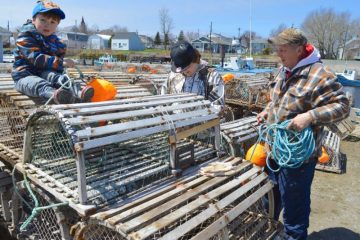 Fishermen from Bay St. Lawrence to Gabarus have caught a couple extra days to prepare for lobster fishing season. Herb Nash of Glace Bay, a fisherman and president of the 4Vn Management Board Association, said opening day for Area 27 was May 15 but was postponed until Wednesday at 5 a.m. He said it the decision came from the Department of Fisheries and Oceans and the harbour representatives due to high winds in the forecast. “They will be adding the two days to the end,” he said. “The fishermen don’t mind the cancellation because of the forecast — they can’t set traps in that weather anyway.” Click here to read the story 11:39
Fishermen from Bay St. Lawrence to Gabarus have caught a couple extra days to prepare for lobster fishing season. Herb Nash of Glace Bay, a fisherman and president of the 4Vn Management Board Association, said opening day for Area 27 was May 15 but was postponed until Wednesday at 5 a.m. He said it the decision came from the Department of Fisheries and Oceans and the harbour representatives due to high winds in the forecast. “They will be adding the two days to the end,” he said. “The fishermen don’t mind the cancellation because of the forecast — they can’t set traps in that weather anyway.” Click here to read the story 11:39
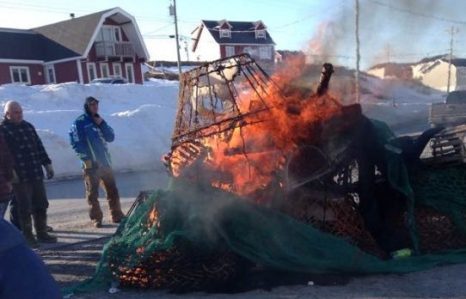
Fishing gear burned in Port au Choix protest
Fish harvesters from Newfoundland’s Northern Peninsula burned crab and lobster pots Tuesday morning outside the Department of Fisheries and Oceans office in Port au Choix, saying they don’t have access to enough fish to make a living. “We feel we are completely abandoned,” said one of the organizers, Stella Mailman. “We are absolutely trash to them. That’s all we are.” Mailman, who fishes for lobster, groundfish and halibut with her husband, said protesters came from communities from Sandy Cove to Parsons Pond, with truckloads of gear. “Crab pots, drag nets, lobster pots, and they actually put them in the parking lot and set fire to them,” she said, estimating there were eight to 10 truckloads burned. click here to read the story 12:12
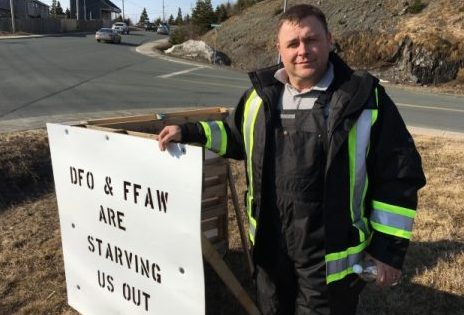
Easter Sunday marks the fourth day of Canadian Fisherman Richard Gillett’s hunger strike.
The vice-president of the Federation of Independent Sea Harvesters of Newfoundland and Labrador (FISH-NL) set up camp in front of the Department of Fisheries and Oceans headquarters in St. John’s on Thursday. One of Gillett’s requests is a meeting with Dominic LeBlanc, the federal minister of Fisheries, Oceans and the Canadian Coast Guard, to ask for an independent review of science and management at DFO. “Up until right now we haven’t heard anything from Minister LeBlanc,” Gillett said. Gillett said he thinks the fishery in Newfoundland and Labrador is close to extinction. click here to read the story 17:25

Hunger Strike – FISH-NL VP protesting outside DFO in St. John’s
The vice president of FISH-NL is camping outside the Department of Fisheries and Oceans building in St. John’s in protest. Richard Gillett, a fish harvester from Twillingate, says he will stay outside the building — without food and drinking only water — until his two demands are met. “I’m going to stay here as long as it takes to get a meeting with the minister of fisheries, and I’m prepared to go all the way on this one,” he said. Gillett is vice president of the Federation of Independent Sea Harvesters of Newfoundland and Labrador (FISH-NL), a group of fishermen trying to break away from the Fish, Food and Allied Workers (FFAW) union. FISH-NL is seeking to be ratified as the bargaining agent for the province’s fish harvesters. Gillett is requesting a meeting with federal Fisheries Minister Dominic LeBlanc, and an independent review of the relationship between DFO and the FFAW. click here to continue reading the story 15:56
FISH-NL: Snow-crab cuts another body blow to fishery; special allocation with links to FFAW should be cut immediately
 The Federation of Independent Sea Harvesters of Newfoundland and Labrador (FISH-NL) says the province’s fishing industry took yet another body blow today with news that the federal Department of Fisheries and Oceans cut the overall snow crab quota by 22 per cent. “Today’s news on snow crab, combined with last week’s almost 63 per cent cut to northern shrimp, spells disaster for the inshore fishery,” says Ryan Cleary, President of FISH-NL. “The very first cut in the total allowable catch (TAC) for snow crab on the tail of the Grand Banks in fishing zone 3N outside the 200-mile limit should be to the special interest allocation caught by the Katrina Charlene, the so-called ‘union boat,’ a quota whose origins are directly linked to the FFAW,” says Cleary. “First things first, the time has come for that conflict of interest to be acknowledged and the quota cancelled and added back to the allocations of independent harvesters.” Read the Press Release here 16:20
The Federation of Independent Sea Harvesters of Newfoundland and Labrador (FISH-NL) says the province’s fishing industry took yet another body blow today with news that the federal Department of Fisheries and Oceans cut the overall snow crab quota by 22 per cent. “Today’s news on snow crab, combined with last week’s almost 63 per cent cut to northern shrimp, spells disaster for the inshore fishery,” says Ryan Cleary, President of FISH-NL. “The very first cut in the total allowable catch (TAC) for snow crab on the tail of the Grand Banks in fishing zone 3N outside the 200-mile limit should be to the special interest allocation caught by the Katrina Charlene, the so-called ‘union boat,’ a quota whose origins are directly linked to the FFAW,” says Cleary. “First things first, the time has come for that conflict of interest to be acknowledged and the quota cancelled and added back to the allocations of independent harvesters.” Read the Press Release here 16:20
FISH-NL: Shrimp cuts impact harvesters/rural communities like a hammer
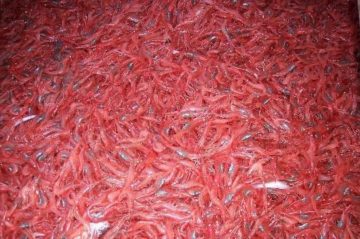 The Federation of Independent Sea Harvesters of Newfoundland and Labrador (FISH-NL) says the massive cut to the northern shrimp quota off the Great Northern Peninsula and southern Labrador (Shrimp Fishing Area 6) has hit the inshore fleet and adjacent communities like a hammer. “The crisis in the shrimp fishery is unprecedented,” says Ryan Cleary, President of FISH-NL. “The situation today is even worse than the groundfish moratoriam of the early 1990s in that many shrimp harvesters have no other species to turn to. The harvesters who do have other species have also taken massive hits.” Read the press release here 17:47
The Federation of Independent Sea Harvesters of Newfoundland and Labrador (FISH-NL) says the massive cut to the northern shrimp quota off the Great Northern Peninsula and southern Labrador (Shrimp Fishing Area 6) has hit the inshore fleet and adjacent communities like a hammer. “The crisis in the shrimp fishery is unprecedented,” says Ryan Cleary, President of FISH-NL. “The situation today is even worse than the groundfish moratoriam of the early 1990s in that many shrimp harvesters have no other species to turn to. The harvesters who do have other species have also taken massive hits.” Read the press release here 17:47
FISH-NL: Reopening the seal hunt – “If licensed sealers want to hunt seal let them hunt seal.”
 The Federation of Independent Sea Harvesters of Newfoundland and Labrador (FISH-NL) is disappointed with a decision by the federal Department of Fisheries and Oceans to reopen the seal hunt to a limited harvest between March 28-April 7. Early last week FISH-NL called on DFO to reopen the harp and hood seal hunt to all harvesters and all fleets in Newfoundland and Labrador by March 25th. The federal government closed the hunt on March 15th to allow time for seal whelping and nursing. On Friday, FISH-NL was informed by federal sources that the seal hunt would reopen by March 28th (which it will be — 6 a.m. Tuesday morning), but not for all fleets and harvesters. Instead, licences will only be issued to a small number of vessels hunting adult seals for Phucolax International, a Fleur de Lys-based sealing operation that’s in the market right now for up to 4,000 animals. “It’s acknowledged by all quarters that an unchecked seal population is having an impact on delicate stocks such as shrimp, crab and cod, so why is DFO putting any restrictions at all on reopening the hunt?” asks Ryan Cleary, President of FISH-NL. “If licensed sealers want to hunt seal let them hunt seal.” Ryan Cleary 14:33
The Federation of Independent Sea Harvesters of Newfoundland and Labrador (FISH-NL) is disappointed with a decision by the federal Department of Fisheries and Oceans to reopen the seal hunt to a limited harvest between March 28-April 7. Early last week FISH-NL called on DFO to reopen the harp and hood seal hunt to all harvesters and all fleets in Newfoundland and Labrador by March 25th. The federal government closed the hunt on March 15th to allow time for seal whelping and nursing. On Friday, FISH-NL was informed by federal sources that the seal hunt would reopen by March 28th (which it will be — 6 a.m. Tuesday morning), but not for all fleets and harvesters. Instead, licences will only be issued to a small number of vessels hunting adult seals for Phucolax International, a Fleur de Lys-based sealing operation that’s in the market right now for up to 4,000 animals. “It’s acknowledged by all quarters that an unchecked seal population is having an impact on delicate stocks such as shrimp, crab and cod, so why is DFO putting any restrictions at all on reopening the hunt?” asks Ryan Cleary, President of FISH-NL. “If licensed sealers want to hunt seal let them hunt seal.” Ryan Cleary 14:33
Federal government protects overabundant grey seal population over fish stocks
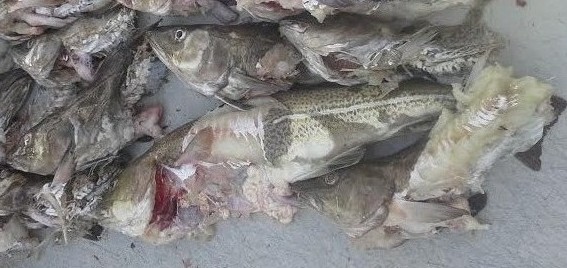 MONCTON, NB – Fish harvesters attending the Gulf Groundfish Advisory Committee this week in Moncton are expressing their frustrations and disbelief over the federal government’s refusal to protect groundfish stocks by controlling the grey seal population. Many species of groundfish will be unable to adequately recover without proper management of the grey seal population. The effect of grey seals on fish populations has been confirmed by scientists, yet the Department of Fisheries and Oceans (DFO) has not taken adequate action to address this problem. An increased harvest of grey seals would aid in allowing groundfish species to rebound, thereby creating new economic opportunities for thousands of families in Eastern Canada. continue reading the press release here 09:08
MONCTON, NB – Fish harvesters attending the Gulf Groundfish Advisory Committee this week in Moncton are expressing their frustrations and disbelief over the federal government’s refusal to protect groundfish stocks by controlling the grey seal population. Many species of groundfish will be unable to adequately recover without proper management of the grey seal population. The effect of grey seals on fish populations has been confirmed by scientists, yet the Department of Fisheries and Oceans (DFO) has not taken adequate action to address this problem. An increased harvest of grey seals would aid in allowing groundfish species to rebound, thereby creating new economic opportunities for thousands of families in Eastern Canada. continue reading the press release here 09:08
Fisheries committee calls for ‘rebuilding plan,’ information sharing on northern cod stocks
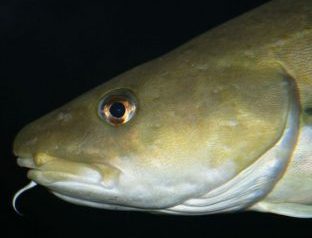 The once-mighty northern cod stock off Newfoundland needs an immediate “rebuilding plan,” according to the Standing Committee on Fisheries and Oceans. The federal committee on the fishery also chastised the Department of Fisheries and Oceans for not yet establishing a fully-developed rebuilding strategy, almost 25 years after the commercial cod moratorium. In a report released Monday, the committee wrote it was “astonished” to learn that DFO had not yet fully implemented recommendations from a 2011 report, which called on DFO to set reference points for the stock. The committee cited expert opinion that warned without a plan, the stock was doomed to perpetual underperformance. While the committee did write that work was underway, it called on DFO to “immediately” create a plan, which should restrict fishing of northern cod until the stock leaves the critical zone, and manage availability of prey like capelin. continue reading the story here 12:15
The once-mighty northern cod stock off Newfoundland needs an immediate “rebuilding plan,” according to the Standing Committee on Fisheries and Oceans. The federal committee on the fishery also chastised the Department of Fisheries and Oceans for not yet establishing a fully-developed rebuilding strategy, almost 25 years after the commercial cod moratorium. In a report released Monday, the committee wrote it was “astonished” to learn that DFO had not yet fully implemented recommendations from a 2011 report, which called on DFO to set reference points for the stock. The committee cited expert opinion that warned without a plan, the stock was doomed to perpetual underperformance. While the committee did write that work was underway, it called on DFO to “immediately” create a plan, which should restrict fishing of northern cod until the stock leaves the critical zone, and manage availability of prey like capelin. continue reading the story here 12:15
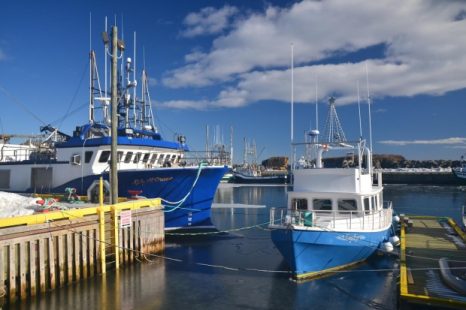
Not what I’m seeing: Crab fisherman thinks stock healthier than scientists say
Port de Grave snow crab fisherman says he’s baffled by a bleak stock assessment recently released by the Department of Fisheries and Oceans. While federal scientists said there has been a whopping 40 per cent decline in the amount of harvestable crab off the coast of Newfoundland and Labrador, Dwight Petten says that doesn’t match what he is seeing on the water. Petten, 51, has been fishing for a quarter century. He and his 27-year-old son own two boats, employ six people and have a 500,000-pound quota which they caught easily in 2016. “We found catch rates the best we’ve ever had, so we’re not seeing what the scientists is saying is happening,” he told the St. John’s Morning Show. Petten, who fishes in Area 3L, from Bonavista to Cape Race, said he is seeing lots of healthy crab, despite the assertion by scientists that there are few small crab to replace the mature stock. continue reading the story here 07:51
Department of Fisheries and Oceans considers making on-board cameras a must in N.S., P.E.I. tuna fishery
Canada’s DFO 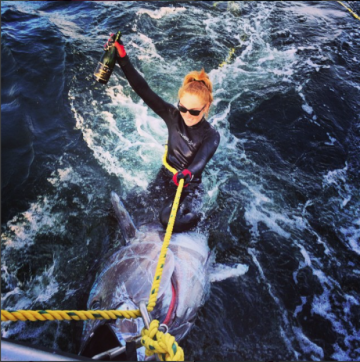 is considering making onboard surveillance cameras mandatory in the tuna fishery in northern Nova Scotia and Prince Edward Island. Next week DFO will release to industry its review of a two-year pilot project that saw cameras installed — starting in 2015 — for the first time in a commercial fishery in Atlantic Canada. The rear-facing cameras are aimed only at fishing activity. The department, which collects and reviews the data, says it may move to full implementation in the Gulf region for the commercial and charter boat catch-and-release bluefin tuna fishery in 2017. “This fishery has seen an increase in reports of non-compliance in recent years,” says a July 2016 briefing note prepared for the federal fisheries minister. More fallout from Operation Hook Up,,, continue reading the story here 10:17
is considering making onboard surveillance cameras mandatory in the tuna fishery in northern Nova Scotia and Prince Edward Island. Next week DFO will release to industry its review of a two-year pilot project that saw cameras installed — starting in 2015 — for the first time in a commercial fishery in Atlantic Canada. The rear-facing cameras are aimed only at fishing activity. The department, which collects and reviews the data, says it may move to full implementation in the Gulf region for the commercial and charter boat catch-and-release bluefin tuna fishery in 2017. “This fishery has seen an increase in reports of non-compliance in recent years,” says a July 2016 briefing note prepared for the federal fisheries minister. More fallout from Operation Hook Up,,, continue reading the story here 10:17
‘A major concern’: Snow crab, shrimp assessments worry fisheries minister
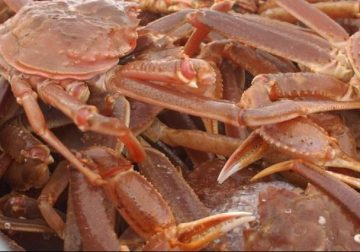 The Newfoundland and Labrador minister of fisheries and natural resources has added his voice to those concerned about what the latest shrimp and snow crab assessments will mean for 2017 quotas. “What we’re hearing from harvesters is that they are concerned and this is a major concern of ours as well,” Steve Crocker said Thursday. “When you look at our shellfish industry, it provides thousands of jobs in our plants and we have thousands of harvesters who rely on these resources for their income.” The federal Department of Fisheries and Oceans estimates the volume of crab available to be caught dropped 40 in one year, and shrimp stocks off the northeast coast of Newfoundland and southern Labrador are at their lowest level ever. Continue reading the story here 16:23
The Newfoundland and Labrador minister of fisheries and natural resources has added his voice to those concerned about what the latest shrimp and snow crab assessments will mean for 2017 quotas. “What we’re hearing from harvesters is that they are concerned and this is a major concern of ours as well,” Steve Crocker said Thursday. “When you look at our shellfish industry, it provides thousands of jobs in our plants and we have thousands of harvesters who rely on these resources for their income.” The federal Department of Fisheries and Oceans estimates the volume of crab available to be caught dropped 40 in one year, and shrimp stocks off the northeast coast of Newfoundland and southern Labrador are at their lowest level ever. Continue reading the story here 16:23
FISH-NL calls for independent, expert review of DFO in light of reported dramatic decline of key stocks
 The Federation of Independent Sea Harvesters of Newfoundland and Labrador (FISH-NL) is calling for an independent, external review of the management/science capabilities of the federal Department of Fisheries and Oceans in relation to the reported dramatic decline of key stocks off Newfoundland and Labrador. “The picture right now for our harvesters is bleaker than the moratorium,” says Ryan Cleary, President of FISH-NL. “When cod stocks collapsed in the early 1990s harvesters could turn to other species, but crab, shrimp and south coast cod are apparently in simultaneous free fall, if not outright collapse, and the common theme is DFO management.” continue reading the press release here 09:32
The Federation of Independent Sea Harvesters of Newfoundland and Labrador (FISH-NL) is calling for an independent, external review of the management/science capabilities of the federal Department of Fisheries and Oceans in relation to the reported dramatic decline of key stocks off Newfoundland and Labrador. “The picture right now for our harvesters is bleaker than the moratorium,” says Ryan Cleary, President of FISH-NL. “When cod stocks collapsed in the early 1990s harvesters could turn to other species, but crab, shrimp and south coast cod are apparently in simultaneous free fall, if not outright collapse, and the common theme is DFO management.” continue reading the press release here 09:32
Potentially precedent setting fisheries case now in the hands of a Federal Court of Canada judge
 A court case looming over Atlantic Canada’s inshore fisheries is now in the hands of a Federal Court of Canada judge. Justice Cecily Strickland reserved her decision Wednesday after two days of legal arguments in an Ottawa courtroom that centred on whether the minister of fisheries has the power to manage the fishery for social and economic objectives outside of fish conservation. Labrador fisherman Kirby Elson is appealing a 2015 decision by the minister to take away his snow crab licence because he refused to exit a controlling agreement with two fish processors, one that allowed them to control the licence and the wealth it generated. The Department of Fisheries and Oceans says such agreements are an end run around its policies that individual fishermen — not corporations — are the beneficiaries of inshore licences. continue reading the story here 12:09
A court case looming over Atlantic Canada’s inshore fisheries is now in the hands of a Federal Court of Canada judge. Justice Cecily Strickland reserved her decision Wednesday after two days of legal arguments in an Ottawa courtroom that centred on whether the minister of fisheries has the power to manage the fishery for social and economic objectives outside of fish conservation. Labrador fisherman Kirby Elson is appealing a 2015 decision by the minister to take away his snow crab licence because he refused to exit a controlling agreement with two fish processors, one that allowed them to control the licence and the wealth it generated. The Department of Fisheries and Oceans says such agreements are an end run around its policies that individual fishermen — not corporations — are the beneficiaries of inshore licences. continue reading the story here 12:09
Labrador fisherman’s lawyers fight to keep his “controlling” agreement with fish processor
 A lawyer for a Labrador snow crab fisherman who had his fishing licence stripped by the federal minister of fisheries said the minister had no authority to do so. Kirby Elson, 62, lost his licence in 2015 because he refused to exit a controlling agreement with two Newfoundland and Labrador fish companies that gave total control of the licence and its wealth to the companies. Byron Shaw, one of Elson’s lawyers, argued Tuesday the minister of fisheries has no authority to interfere in a contract that transfers wealth between a harvester and a third party. He said the policy the Department of Fisheries and Oceans (DFO) is enforcing has nothing to do with the management of fish stocks. The case opened Tuesday at the Federal Court of Canada and is expected to last two days. continue reading the story here Stakes of inshore fisheries case are ‘absolutely massive,’ says observer, Why people are watching this case? continue reading the story here 08:04
A lawyer for a Labrador snow crab fisherman who had his fishing licence stripped by the federal minister of fisheries said the minister had no authority to do so. Kirby Elson, 62, lost his licence in 2015 because he refused to exit a controlling agreement with two Newfoundland and Labrador fish companies that gave total control of the licence and its wealth to the companies. Byron Shaw, one of Elson’s lawyers, argued Tuesday the minister of fisheries has no authority to interfere in a contract that transfers wealth between a harvester and a third party. He said the policy the Department of Fisheries and Oceans (DFO) is enforcing has nothing to do with the management of fish stocks. The case opened Tuesday at the Federal Court of Canada and is expected to last two days. continue reading the story here Stakes of inshore fisheries case are ‘absolutely massive,’ says observer, Why people are watching this case? continue reading the story here 08:04
Latest DFO stock assessment unveils a poor outlook for snow crab
 It’s not a pretty picture. In a technical briefing Monday, Darrell Mullowney, lead scientist for snow crab in the NL region for the Department of Fisheries and Oceans (DFO) said the latest stock assessment on snow crab in the Newfoundland and Labrador region shows an overall 40 per cent decline in exploitable biomass from 2015-16. Since 2013, the decline of exploitable biomass has been 80 per cent. Exploitable biomass refers to the crab that are adult, and of legal size — a shell size greater than 95 mm — for commercial fishing. The DFO numbers come from their own trawl surveys — one in fishing zones off the south coast each spring, and the other in northern fishing areas in the fall — as well as from reports from observers on commercial fishing vessels, the log books of the crab fishing fleets, and trap surveys conducted by DFO in inshore areas. The decline in crab stocks, explained Mullowney, is due to two major factors: warming water temperatures and groundfish. continue reading the story here 11:04
It’s not a pretty picture. In a technical briefing Monday, Darrell Mullowney, lead scientist for snow crab in the NL region for the Department of Fisheries and Oceans (DFO) said the latest stock assessment on snow crab in the Newfoundland and Labrador region shows an overall 40 per cent decline in exploitable biomass from 2015-16. Since 2013, the decline of exploitable biomass has been 80 per cent. Exploitable biomass refers to the crab that are adult, and of legal size — a shell size greater than 95 mm — for commercial fishing. The DFO numbers come from their own trawl surveys — one in fishing zones off the south coast each spring, and the other in northern fishing areas in the fall — as well as from reports from observers on commercial fishing vessels, the log books of the crab fishing fleets, and trap surveys conducted by DFO in inshore areas. The decline in crab stocks, explained Mullowney, is due to two major factors: warming water temperatures and groundfish. continue reading the story here 11:04
Federal Court of Canada – Legal challenge threatening autonomy of inshore fishery opens today
 The Federal Court of Canada will begin hearing a test case today in Ottawa that could overturn a decades-old policy that prevents a corporate takeover of inshore fishing licences in Atlantic Canada. The seafood processing industry, inshore fishermen’s groups and the Department of Fisheries and Oceans (DFO) are all watching the case closely, albeit with very different expectations. “The stakes are important because we have seen other fisheries be taken over by corporations and it leaves less money in the hands of individuals and communities,” said Melanie Sonnenberg, president of the Canadian Independent Fish Harvesters Federation. The Federal Court case centres on Kirby Elson, a fisherman from the Labrador community of Cartwright, N.L. Elson was stripped by DFO of his snow crab licence in 2015 when he refused to exit a controlling agreement with fish processor Quinlan Brothers and a related company. Under the 2003 agreement, the company controlled the licence and the wealth it generated. Quinlan Brothers paid the licence fee, provided the vessel and crew, and paid for the insurance and maintenance. continue reading the story here 09:10
The Federal Court of Canada will begin hearing a test case today in Ottawa that could overturn a decades-old policy that prevents a corporate takeover of inshore fishing licences in Atlantic Canada. The seafood processing industry, inshore fishermen’s groups and the Department of Fisheries and Oceans (DFO) are all watching the case closely, albeit with very different expectations. “The stakes are important because we have seen other fisheries be taken over by corporations and it leaves less money in the hands of individuals and communities,” said Melanie Sonnenberg, president of the Canadian Independent Fish Harvesters Federation. The Federal Court case centres on Kirby Elson, a fisherman from the Labrador community of Cartwright, N.L. Elson was stripped by DFO of his snow crab licence in 2015 when he refused to exit a controlling agreement with fish processor Quinlan Brothers and a related company. Under the 2003 agreement, the company controlled the licence and the wealth it generated. Quinlan Brothers paid the licence fee, provided the vessel and crew, and paid for the insurance and maintenance. continue reading the story here 09:10
Cod an option in face of looming shrimp cuts, says FFAW
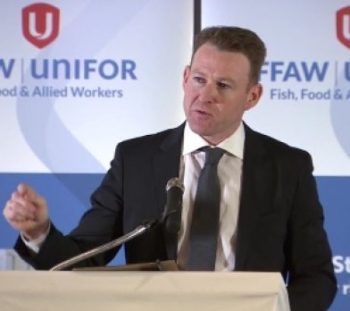 The Fish, Food and Allied Workers union says expansion into commercial cod fishing is a possibility for harvesters, as another cut to overall shrimp quotas looms for next season. Following revelations by the Department of Fisheries and Oceans this week that the shrimp stock in the crucial Zone 6 area off of Newfoundland has fallen again, FFAW president Keith Sullivan says it looks like another quota cut is coming — but there may be alternatives. According to the Department of Fisheries and Oceans, the landed value of shrimp in Newfoundland and Labrador in 2016 dropped to $276 million. Read the story here 08:29
The Fish, Food and Allied Workers union says expansion into commercial cod fishing is a possibility for harvesters, as another cut to overall shrimp quotas looms for next season. Following revelations by the Department of Fisheries and Oceans this week that the shrimp stock in the crucial Zone 6 area off of Newfoundland has fallen again, FFAW president Keith Sullivan says it looks like another quota cut is coming — but there may be alternatives. According to the Department of Fisheries and Oceans, the landed value of shrimp in Newfoundland and Labrador in 2016 dropped to $276 million. Read the story here 08:29
Northern shrimp stocks still ‘critical’ – no improvement in spawning biomass
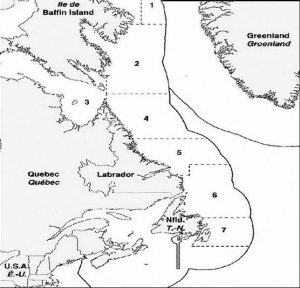 It’s the season to talk about the prospects for the shrimp fishery in Newfoundland and Labrador and the initial information for the new season does not look promising. In a media briefing this morning, Katherine Kanes, mathematician/stock-assessment biologist with Department of Fisheries and Oceans (DFO) outlined the current picture from the most recent stock assessments, for northern shrimp in fishing areas 6, 5 and 4 — off the Northern Peninsula and the coast of Labrador. Data collected from the fall multi-species trawl survey by DFO, as well as information from fishers shows there’s not been much improvement from last year. In SFA 6 — the area that most inshore commercial fishers from this province depend on for their shrimp catches — the biomass of female shrimp is still in the critical zone, she said. Continue reading the story here 09:26
It’s the season to talk about the prospects for the shrimp fishery in Newfoundland and Labrador and the initial information for the new season does not look promising. In a media briefing this morning, Katherine Kanes, mathematician/stock-assessment biologist with Department of Fisheries and Oceans (DFO) outlined the current picture from the most recent stock assessments, for northern shrimp in fishing areas 6, 5 and 4 — off the Northern Peninsula and the coast of Labrador. Data collected from the fall multi-species trawl survey by DFO, as well as information from fishers shows there’s not been much improvement from last year. In SFA 6 — the area that most inshore commercial fishers from this province depend on for their shrimp catches — the biomass of female shrimp is still in the critical zone, she said. Continue reading the story here 09:26



































